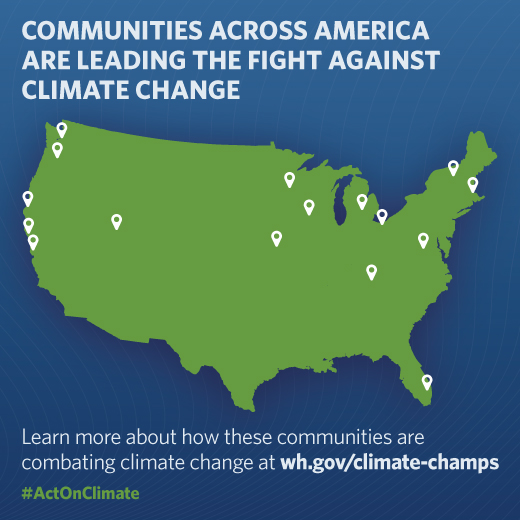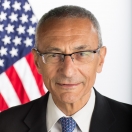
Deep, persistent drought. Longer, fiercer wildfire seasons. High tides flooding downtowns. Severe storms wreaking havoc. This is the picture from the front lines of climate change — in communities across America.
And as they face these immediate climate crises, cities, towns, counties, and tribes of every size and in every region of the country have stepped up to be part of the solution: identifying their vulnerabilities, cutting carbon pollution, creating jobs by investing in clean energy and energy efficiency, and finding innovative solutions to make their communities and infrastructure more resilient to climate extremes.
Today, in recognition of their strong commitment to the fight against climate change, the Obama administration is naming 16 of these communities as the first class of Climate Action Champions.
Click here for the full list of Climate Action Champions.
This diverse set of winning communities have already accomplished a great deal. Dubuque, IA has already adopted targets to reduce greenhouse gas emissions 50 percent below 2003 levels by 2030. Recognizing that sea level rise poses serious risks for infrastructure along its coasts, Boston, MA has already integrated climate resilience into their approval process for new construction projects. The Blue Lake Rancheria tribe in California has reduced energy consumption by 35 percent since 2008.
And as Climate Action Champions, they’ll be able to do even more. The selected communities will benefit from facilitated peer-to-peer learning opportunities and targeted support from a range of federal programs, including technical assistance from renewable energy experts, accessible climate data and tools, and opportunities for tailored emergency preparedness exercises.
One of the key requests the State, Local, and Tribal Leaders Task Force on Climate Preparedness and Resilience made when they delivered their report to the President last month was for more assistance navigating resources and funding opportunities across the breadth of the federal government. That’s why each Climate Action Champion will be assigned a federal coordinator to help identify technical assistance, additional resources, and opportunities to work with agency programs, philanthropies, and the private sector to achieve the community’s climate goals.
As other communities across the United States and around the world look to grow more sustainable local economies, to use cleaner energy sources, and to build resilience to extreme climate events, the Climate Action Champions will demonstrate what ambitious local leaders can achieve in the face of a global challenge.
Read the White House fact sheet on the winning Climate Action Champions here.



